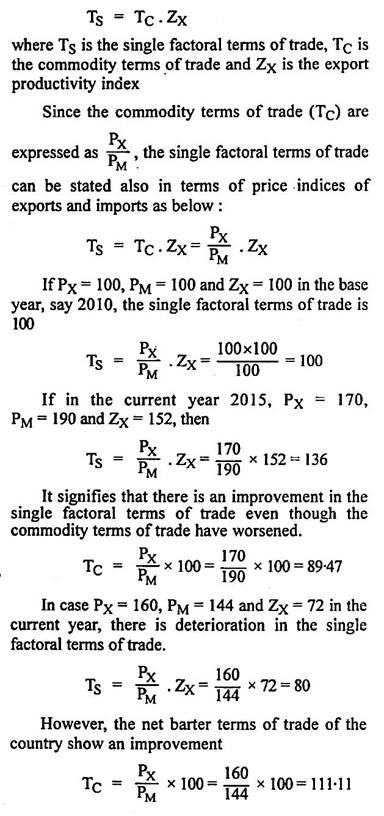The concept of income terms of trade attempted — a correction in the net barter terms of trade for changes in the volume of exports. Jacob Viner made another modification over the net barter or commodity terms of trade. He corrected the commodity terms of trade for changes in factor productivity in the production of export goods.
The concept of terms of trade developed by him is called as the ‘Single Factoral Terms of Trade’. It is determined by multiplying the commodity terms of trade with the productivity index in the domestic export sector. The single factoral terms of trade imply a ratio of the export price index and import price index adjusted for changes in the productivity of factors used in the production of export goods.
It can be stated as:
From the above illustration, it is clear that change in the export productivity index can have highly significant effect on the terms of trade of a country. If the increase in productivity in the export sector causes such a substantial decline in costs that export prices have declined by a marked extent, it is possible that the commodity terms of trade become unfavourable even when the single factoral terms of trade have improved.
ADVERTISEMENTS:
From the point of view of a developing country, where the process of growth involves the use of improved techniques of production, the single factoral terms of trade are more representative and scientific compared with the commodity terms of trade.
Criticisms:
This measure of terms of trade is, however, criticised on the following main grounds:
ADVERTISEMENTS:
(i) Difficulty in the Measurement of Productivity:
The exact measurement of productivity and changes therein is quite difficult, as factor productivity depends upon some non-quantifiable psychological and technical factors. The productivity of a factor unit differs not only from one export industry to another but also from one plant to another. That causes serious complication in the computation of productivity index and changes in it over different periods.
(ii) Not a Reliable Index of Gain from Trade:
The terms of trade are supposed to be an index of gains from international trade of a country. It is possible that increase in productivity index makes the single factoral terms of trade favourable but the rise in productivity in export sector and consequent fall in production costs and export price index can transfer the gain from higher productivity and trade to the foreign country. The productivity increase may occur in the exporting country but the productivity and trade gains go to the importing country.
ADVERTISEMENTS:
(iii) Increase in Global Inequalities:
The increased productivity in the export sectors of the advanced countries like U.S.A., Japan and the West European countries has brought about considerable improvement in their single factoral terms of trade while keeping their net barter terms of trade also favourable for them. However, the improvement in productivity in the export sectors in the LDC’s has made both commodity terms of trade and single factoral terms of trade unfavourable.
This has happened because the export prices of poor countries have been secularly declining, whereas the export prices of advanced countries have remained higher despite a rise in productivity. This has accentuated the global inequalities of income and wealth. For this crucial reason, the single factoral terms of trade cannot be an appropriate index of welfare and living standards.
(iv) Neglect of Increase in Productivity in Foreign Countries:
The single factoral terms of trade give importance only to improvement in the productivity in the export sector. It fails to take into account the possible change in the productivity in the foreign countries and their resultant effect on the terms of trade. This deficiency was removed by Jacob Viner through his introduction of the concept of double factoral terms of trade.
